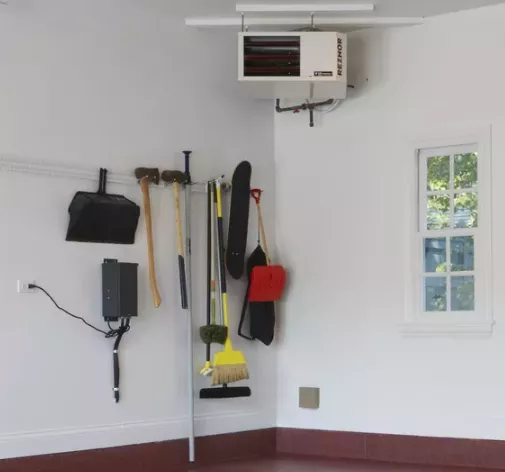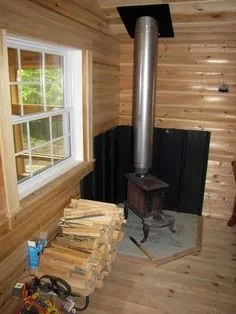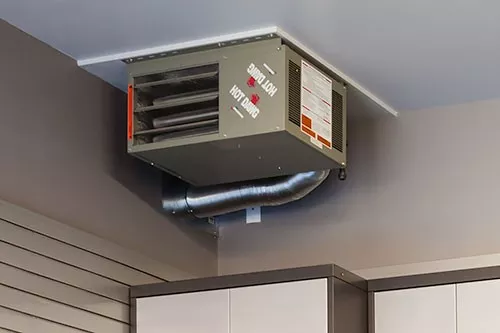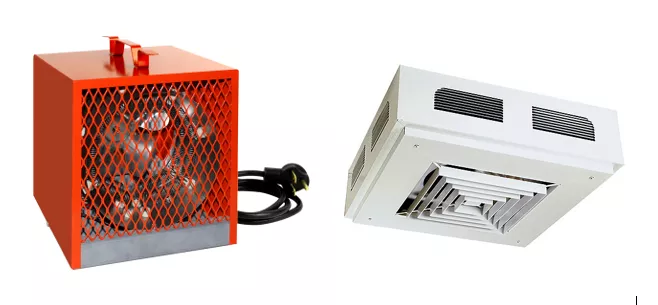Have you made the decision to get a heating system for your garage or is your current one showing signs of age? Whether attached to your house or in the backyard, there are several possible solutions for heating your garage.
Of course, the most important point you should keep in mind is which source of energy is the easiest and most economical for you in your area: electric, natural gas (propane), fuel oil or even wood.

Why should I heat my garage?
That’s a pretty basic question, right? If you don’t spend a lot of time there, it seems a little crazy to bother heating it. Nevertheless, there are a variety of good reasons to do so:
You have water pipes that run through or near your garage and aren’t well insulated, increasing the risk that they freeze if your garage isn’t heated and protected from extreme temperatures.
Your garage is a kind of entryway for your house. Cold air from your garage can slip into living areas, causing your home heating system to work harder to maintain a temperature level that is comfortable.
If you use your garage as a workspace, you are probably less inclined to use it in the winter. Adding an appropriate garage heating systems can make it usable throughout the year.
Key questions to ask…
Before making a commitment to buy a certain system, answer the following questions:
-
How big is your garage?
This is most likely the first question you will be asked if you go to a heating specialist. So come armed with not only the length and width of your garage, but also the height. This way you can calculate the cubic feet (meters) and thus the area needed to heat.
-
How will you use your garage?
Figure out how much time you will spend in your garage and for what activities (such as tinkering on vehicles, working out, or a kids’ playroom). Will you park your car(s) there often or rarely?
-
Is it just as important to keep your garage cool in the summer as it is to keep it warm in the winter?
If summer’s heat and humidity are excessive in your part of the country, wouldn’t you opt for keeping the garage at a suitable temperature and humidity?
A wood stove
This is often the easiest solution for those who live in remote areas and also have easy access to wood. In many instances where the garage is detached and a distance from the house, this type of heating is more common. In any case, be sure you check with your home insurance company for installation guidelines and chimney standards, such as heat shielding for the walls and the fire resistance of the chimney. It may be that your town’s regulations limit the use to certain types of wood stoves and require the installation of either slow-burning or pellet stoves.
As an aside, it is not recommended to burn pressure-treated wood or painted or stained construction lumber waste either. Limit yourself to dry wood. Lastly, the chimney must be cleaned regularly which, when added to the other work required for a wood stove, may cause many to pass on this choice.

An oil or natural gas/propane heating system
If you use fuel oil or natural gas to heat your house, it can be much easier to just extend the central system to include your garage. There are also smaller, stand-alone systems but they are made for spaces of limited size. They come in unvented or direct-vent models.
A great choice for supplying heat to a garage, especially if your home already uses natural gas or propane for your oven, clothes dryer, furnace or fireplace, is a direct-vent system.

An advantage of this type of heater is that it both draws in outdoor air to support combustion and exhausts flue products, including carbon monoxide, to the outdoors via a pipe in the wall. Though do-able by yourself, it is highly recommended to use a professional for the installation. Direct-vent heaters are likely the best solution for heating a garage where the outdoor winter temperature is usually below freezing or the garage needs to be kept above freezing.
Electric heating systems
This type of heating has almost an endless choice of styles and sizes. There are portable space heaters that can be plugged in to a normal 120‑volt outlet and placed wherever you need them. Then, there are installed 240-volt overhead heating units or even permanent baseboard heaters. As well, there even exist systems able to be hooked up to 208 and 480 volts.

What sets electric heaters apart is their ease of installation and use. In addition, they are quiet, clean and generally inconspicuous. Neither a chimney nor ventilation ducts are required and they are relatively inexpensive to purchase and install. On the other hand, depending on what you pay for electricity (dollar per kilowatt/hour), they can be comparatively costly to operate on a constant basis, especially if you reside in an area where winter temperatures stay frigid for long periods. If this is your choice for regularly heating your garage, make sure it is well insulated.
You also have location options with electric units: either suspended or mounted on walls or ceilings, oriented either horizontally or vertically. And, as electric units are not placed on the floor, they are safer and not in your way while working or moving around the garage.
A couple of things to consider if you are installing a ceiling unit: be sure aim the unit or louvers at a 45-degree angle toward the floor and locate the thermostat far from the heat source. Also, it is normally best to mount the heating unit opposite the garage door at the back of the garage, especially if your door is well insulated and weathertight for both heat and cold.
Extending your home’s heating and air conditioning (HVAC) system
For an attached garage, if you already have a heating, ventilating and air conditioning system for your house, it is feasible to increase the ductwork in your system to include the garage. The biggest benefit is that you will be cooling and heating your garage at the same time. This type of system accommodates homes located in areas where winters are not too harsh but the summers are still hot and humid.
However, keep in mind that this modification can greatly increase the load on your HVAC system. As well, be sure that the air in your garage is not circulated throughout your home causing air quality concerns. For both of these reasons, you should contact a specialist in this type of system before going ahead with this type of system.
Your garage door is an important component…
Remember that the garage door is your “fourth wall”, and, on top of that, it’s movable. As such, if your garage is insulated, a weathertight and properly insulated garage door should be chosen to stand up to winter’s freezing temperatures and summer’s heat. So contact us at 1-877-794-4223 today.
We know garage door systems better than anyone else. We can advise you on the best garage door system to meet your needs as well as your budget. If you’d like, we can email you a quotation.









Add new comment